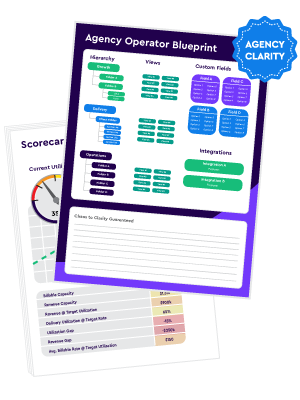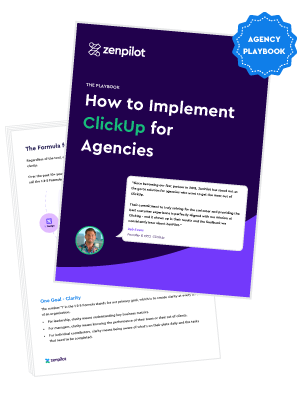What Should an Agency Client Contract Contain?
1) Don’t Use Legalese
Legalese doesn’t make a contract more secure, nor does it impress anybody. In fact, legalese can make things a whole lot worse.
Legalese not only frustrates your clients but ends up confusing both of you. This can lead to interventions from a law mediator (which could have been easily avoided if things were stated clearly in layman’s terms)
Be As Specific As Possible
TL;DR: Make your terms crystal clear because ambiguity can only work against both you and your clients.
2) Start by Citing Both Parties
Every contract should start by introducing both parties by their legal names and legal business addresses. This will prevent any misidentification and ensure the right business is bound to the terms.
You can add abbreviations to be used throughout the contract such as “company” for you and “client” for your client, but only after you cite the proper names first. If you don’t do this, the contract isn’t legally binding and likely won’t hold up in the event of a dispute.
3) Specify Duration and What Signifies the End
When does the contract begin? Again, be specific with the date. In an agency scenario, the end date would signify the completion of the contract.
But what qualifies as completion? For a retainer, a contract would just end on a specific date. However, it can be different for project-based work. Since projects take varying periods of time, nailing an end date down can be rather tricky.
For these cases, it’s wise to cite that the contract will conclude when the deliverables are completed.
4) Clearly Define the Scope of Work
This is the area where most contracts fall short.
Hopefully, you’ve detailed your activities with the client during the sales process. If you went into enough depth there, it could really be as simple as just copying and pasting.
If you weren’t incredibly specific, you need to get specific here.
In the scope of work, talk about volume. How many templates are you creating? How many pages are being implemented? How many rounds of revisions are included, and what happens when that limit is reached?
Leaving the scope of work vague leads to unintentional scope creep.
The more specific you can be, the better off you and your clients will be.
5) Talk About Additional, Out of Scope Work
This is another item that needs addressing. What happens if the client requests something outside the scope of work? Address how those requests are treated and what amendments may need to be made if the scope of work changes.
But how do you identify such tasks? When trying to determine whether you’re being asked to work outside the scope of your job description, there are a few factors to consider such as:
- The tasks being performed
- Whether or not the tasks are similar to what the employee was hired to do
- If the task is primarily performed during working hours
- If the task benefits the company employing you in any way
Of course, there are exceptions that may not be plainly written into your contract. Whenever a team member is sick or on vacation, it’s usually expected that the rest of the employees may take on extra work outside of their regular scope to cover for them.
6) Identify Budget and Payment Terms
This is another area to be specific and intentional about. Before you write the contract, talk with your client about what’s possible for payment frequencies.
For a retainer, it’s customary for payment to occur once per month.
For a project, it’s customary for half to be paid upfront with the remaining half being paid after completion.
What Happens If Payments Are Late?
This is the place to talk about how late payments are treated. Every industry, from construction to appliances, talks about late payments. As agencies, we can’t be any different.
A common payment timeframe is a Net 21.
This means the client has 21 days to pay after receiving the invoice.
Standard terms are a three-percent late fee for late payments. It’s important to discuss this. Although a late fee of three percent might not equal much, it’s enough of a notation to encourage timely payments.
As an agency, you have the choice to waive late fees as a kind gesture but it’s still good to have this in place in case a client is chronically late on their payments.
Related: Beam Content Increases Annual Contract Value by 42% with ZenPilot and ClickUp
7) Address Refund Requests
One of the biggest mistakes I made early in my agency career was not addressing refund requests.
Typically, agencies don’t really have to deal with refund requests.
Still, we need to treat ourselves like a true business and think through all of the possibilities. The opportunity for refund requests always exists and, if we don’t address them, we’ll land in trouble.
Some Refund Request Terms
One thing you want to try to avoid is a refund request that occurs long after work is completed. I typically recommend that no refunds will be distributed after work is completed and final payment is received.
If you don’t talk about this, who’s to say that a client couldn’t request a refund for any reason after the fact? Yes, you’ve delivered, but it’s left up to the imagination if you don’t specify terms. It might take a legal intervention, which is a headache.
Do yourself a favor and cover this base.
You have to think beyond this situation, however, which may very well come up. Another is what happens if the client terminates halfway through your agreement. How are refund requests handled on past payments?
8) Termination Clause
It’s important to always offer a way out for both parties. Sometimes, things don’t work out. Maybe one side or the other isn’t performing. In other cases, maybe the organization runs into some financial hardships and has to end things early.
How is Termination Engaged?
Talk about how termination is initiated. I recommend that termination notice be delivered at least seven days in advance via email or letter. Informal phone conversations, chat messages, and texts shouldn’t be an acceptable means of notice.
What Happens to Further Payments in This Case?
It’s important to address what happens in a variety of termination situations. For example, if the client terminates the agreement before the project is completed, what do they get from the partnership to take with them? Do they access the final files or not?
It’s worth noting that only outstanding work must be compensated in the case of termination and that further payments will halt. It’s just another way of clarifying what happens once the contract concludes.
9.) Have a Breach of Contract Clause
In my years in agency life, I’ve only ever been faced with one breach of contract. But, unfortunately, I didn’t specify what constitutes a breach of contract which resulted in a major loss.
Breach of contract is such a key notation to make.
It’s just another area of clarity that communicates specific expectations. One of the major causes for a breach of contract should be a client engaging with another agency to accomplish the same work without terminating your agreement first.
It would be best if you also address the consequences of a breach of contract.
10.) Discuss Copyrights and Who Holds Them
While we may not often think about it right away, copyright is a major clause to consider.
At the end of the day, who owns your work? You can go one of two ways: either the client retains the copyright or the copyright is leased to the client. The latter, more complicated approach is less common structure and can lead to disputes down the line.
Remember, just because you paid for work that doesn’t mean you automatically get the copyright in the eyes of the law. You should be especially cautious when hiring contractors from freelancing platforms since the default copyright standards vary wildly.
For instance, Fiverr automatically assigns copyright to the client for all “Gig” projects while Upwork has copyright terms under the Optional Terms section. This is definitely something to check on before hiring a contractor on one of these platforms.
11.) Non-Disclosure Agreement (NDA)
Privacy couldn’t be more important for both you and your clients. A built-in NDA will cite that you’re not going to talk about your client’s private business without their permission. In turn, they offer you the same treatment.
One additional note: I can’t stress how important it is to also build in NDAs into your employee/contractor agreements. If your agency isn’t allowed to talk about unreleased news about your clients, and your team doesn’t understand this, they could spill the beans on a project and get everyone in trouble. Client secrets should be kept within the agency’s circle of trust. Ongoing projects should be kept there too until they’re completed.
12.) Indemnity
What happens if a negative situation occurs as a result of one of the assets you’ve created? Maybe you didn’t even necessarily cause it. For example, maybe the website causes a lawsuit because your client’s marketing manager botched the messaging.
Are you responsible? Can that lawsuit go back to you?
Essentially, indemnity in the legal sense keeps you off the hook for damages.
Here’s the typical statement used for indemnity:
“[Client Name] agrees to indemnify and hold harmless [Agency Name] of and from any and all claims, demands, losses, causes of action, damage, lawsuits, judgments, including attorneys’ fees and costs, to the extent caused by or arising out of or relating to the work of [Agency Name].”
Consult Legal Help Before Using Contracts
This is a laundry list of items to consider in your contracts.
Before moving forward with any legal document, make sure you have legal help review it. They might notice something you’re missing or might have something game-changing to add.
Happy contracting!
And if you need help, book a call with our team. We are here to help!
Or, check out there additional resources:
- Read: What is the Best Tool to Create Contracts for Agencies
- Read: What to Include in a Retainer Contract
The Only Fully Guaranteed Agency Operations Improvement Framework
Get 360 clarity into your operations or your money back, guaranteed.





